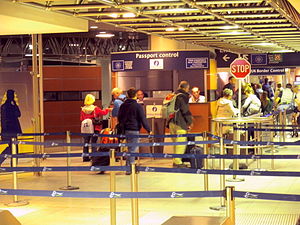
Juxtaposed controls (in French: bureaux à contrôles nationaux juxtaposés, or "BCNJ"; in Dutch: kantoren waar de nationale controles van beide landen naast elkaar geschieden) are a reciprocal arrangement between Belgium, France, the Netherlands and the United Kingdom whereby border controls on certain cross-Channel routes take place before boarding the train or ferry, rather than upon arrival after disembarkation. With the exception of the Eurotunnel Shuttle route, customs checks remain unaffected by juxtaposed immigration controls and continue to take place upon arrival after disembarkation.[1] Belgium, France and the Netherlands are all member states of the European Union and part of the border-free Schengen Area. The United Kingdom, on the other hand, has never participated in the Schengen Area, even when it was a member state of the European Union. As a result, juxtaposed controls aim to increase the convenience and efficiency of border checks when travelling by train or ferry between the Schengen Area and the UK by removing the need for immigration checks on arrival and by streamlining checks on departure. At the same time, juxtaposed controls are intended to detect and prevent illegal immigration. In 2016, there were over 56,000 instances when people were refused entry to the UK at the juxtaposed controls.[2]
- ^ "An Inspection of Juxtaposed Controls (November 2012 - March 2013)" (PDF). Independent Chief Inspector of Borders and Immigration. 8 August 2013. para 4.2. Retrieved 28 March 2020.
- ^ "Fact sheet: The UK's juxtaposed border controls". Gov.uk. Home Office. 11 July 2017. Retrieved 11 April 2020.